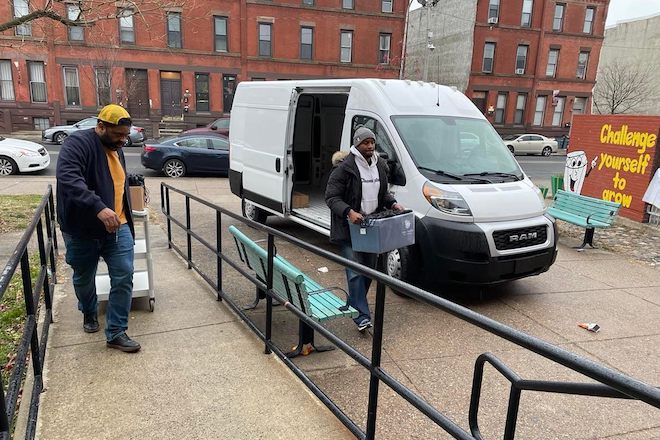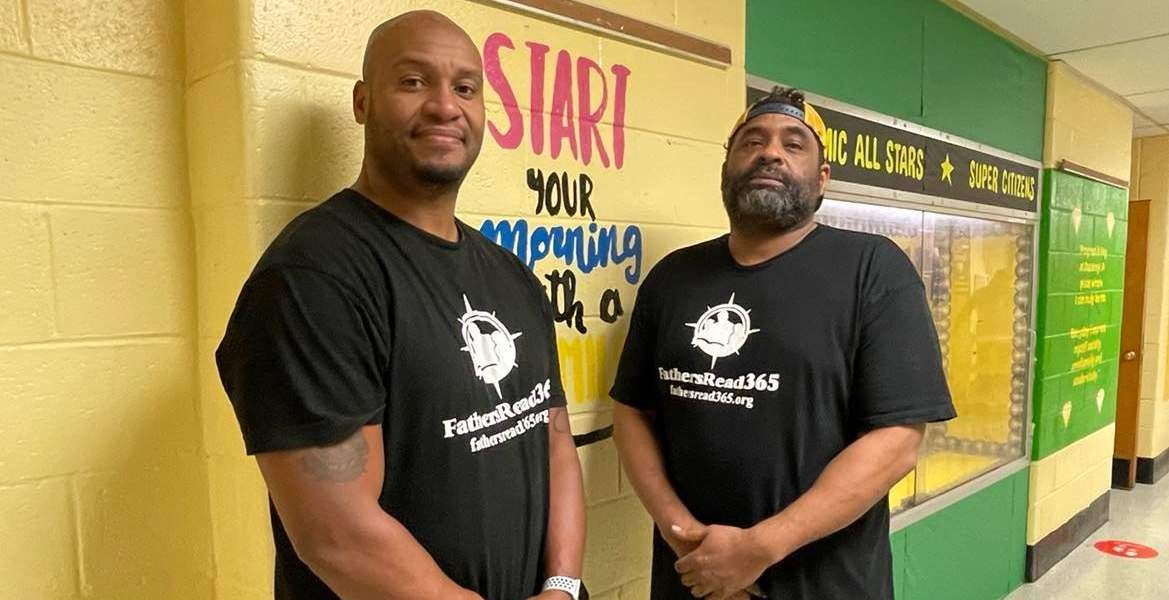When dozens of pre-kindergarten and kindergarten students filed into the cafeteria at the Tanner G. Duckrey School in North Philadelphia before their winter break, it wasn’t for a routine lunch.
The students came to the caf to meet two local dads, Brent Johnstone and Akeiff Staples, the co-founders of FathersRead365. About 35 times a year, Johnstone and Staples come to schools like this one to read books — including two of their own — and share positive messages about reading, and self-esteem.
Johnstone and Staples stand for their 30-minute presentation. But they don’t stand still. Instead, they run in place, gesture to the audience, raise their voices in calls and responses, and offer visual and audible praise to the kids. On this day, their audience was clearly captivated — and clearly thrilled to leave the room carrying their own bags of books, 13 per bag.
Crystal Edwards, principal of William D. Kelley School also in North Philadelphia, another school that’s hosted FathersRead365, believes students leave the presentation with more than reading materials. They leave with a heightened sense of self worth. “Being able to connect their stories with their own lives, even when they are 3, 4, 5 and 6-years-old, that literacy connection into their real life is so important.”
A powerful message
“We give you these books because we love you,” Johnstone tells the Duckrey students. “Opening a book can take you anywhere in the world. We could be in China. We could be in Australia. We could be in Africa. We could be in Disneyland if you want to.”
The mission of FathersRead365 is not to teach students how to read, but to encourage early learners and their parents along the journey to reading — and then reading more. “We’re giving the children the resources to be able to read and to start their home personal libraries. We also work with their parents on effective ways to get the best out of reading for their child,” Johnstone says.
“Those [literacy] scores are the reason why we started FathersRead365, because there’s no way educators are going to be able to get them back on track by themselves,” says Brent Johnstone.
In addition to presenting to children alone, Staples and Johnstone host evening sessions with parents — fathers especially — to help them read with their children. The duo doesn’t specifically measure the impact of their work. They just know teachers and families keep coming back to them for more.
Research has long found early literacy to be a reliable marker of success in later life. One of the best-known studies came about in 1998, when the National Association for the Education of Young Children and the International Reading Association released a joint position statement endorsed by a dozen education organizations.
“One of the best predictors of whether a child will function competently in school and go on to contribute actively in our increasingly literate society is the level to which the child progresses in reading and writing,” the statement reads. “The early childhood years — from birth through age eight — are the most important period for literacy development.”
A vision to help more students read
Johnstone, the father of two children, is originally from Mount Airy, and a graduate of Germantown Lankenau High School. Staples, a father of three, hails from Media, Delaware County, where he graduated from Strath Haven High School. The two became friends while playing football at Temple University in the late 90s.
Even as college kids, they knew they wanted to do more for their communities.
Johnstone’s major in social work helped him get involved with the city’s youth. “Through my internships, I began to work in North Philadelphia in a lot of different agencies and daycares in certain schools. Literally those last two years of working in the community prepared me for what I was going to be doing later in life,” he says.
Staples, originally majored in sports and recreation management and bounced around five majors until he landed on geography and urban studies — where he learned more about community work.
Though they had little time outside of football to talk about careers, years later, they ended up on similar paths.
In 2011, Staples founded Fathers Lead to help formerly incarcerated dads create a path for themselves as they re-enter society. “I wanted to give them tools to really be productive in life after their time there,” he says.
Two years later, Johnstone decided to honor his late father Isaac Johnstone by creating Fathers Day 365, an effort to purposefully celebrate — as opposed to criticize — Black fathers. “Men were getting a real bad light on social media, and I just wanted to bring light to the positive fathers engaged with their families and their community,” he says.
“We had similarities, but weren’t necessarily the same mission,” says Johnstone. Still, they decided they wanted to do the good work together.
At first, they focused on incarcerated fathers. But the more research they gathered, the more they realized they could impact early literacy as Black men and Black fathers. “That’s when we had that aha moment, like: We can get ahead of the curve before these kids end up in any type of system,” Staples says.
In January 2017, the pair founded FathersRead365.

A personal message
The two dads stepped into the initiative with their own challenges: Johnstone is dyslexic; Staples has diabetes.
They purposely craft their message to where students can relate to their personal hurdles. In addition to raising awareness about reading, Johnstone and Staples also emphasize healthy living, like going to bed early and eating fruits and vegetables. They’ve also written two books of their own. I’m Beautiful! I’m Proud! and Mr. Healthy Snacks touch on self-esteem issues and go into Johnstone overcoming dyslexia and Staples’ battle with diabetes.
Including personal issues makes their presentation all the more authentic, especially for Black students who make up the majority of students at Duckrey and Kelley.
Says Edwards, “So when we look at our children being able to engage with text and words and imagination and seeing two Black males who look like their father, uncle, brother, and grandpa and making that connection is just tremendous.” The principal reports her school’s literacy scores have improved this year — and gives credit to programs like FathersRead365 for their contribution.
Early literacy for Black children, boys especially
Sharif El-Mekki, founder of the Center for Black Educator Development, says Black boys in particular are sensitive to their teachers’ expectations and racial biases.
“When expectations are low and rife with racism, Black boys — girls too — can internalize this and short circuit their own positive racial identity. Self-loathing, self-hatred, lack of purpose and pride often manifests into self-destructive behaviors and often what’s harmful to one’s self becomes, in myriad ways, harmful to our community,” he says.
Research by University of North Carolina at Chapel Hill School of Education Assistant Professor Constance Lindsey and her colleagues shows Black boys are up to 39 percent less likely to drop out of high school — and up to 29 percent more likely to go to college if they have a single Black teacher.
“The role of mentorship, support, cultural awareness and understanding and empathy are critical to a Black boy’s motivation, sense of belongingness in school and purpose in life,” says El-Mekki.
Newly-elected president of the Philadelphia Board of Education Reginald Streater has been vocal over the need to improve literacy among public school students. He thinks initiatives like FathersRead365 could be a boost in helping the district meet benchmarks in its system of accountability called “goals and guardrails” and help drive home the need to have Black fathers involved in the developmental years of their children.
“It’s important for fathers to not only read to their children, but to be seen reading,” Streater tells The Citizen. “My son is getting to an age where he’s starting to mimic me. So if one of the things my son mimics is reading, I know half of the battle is done and that can help support the teacher once he’s in school to not have to be able to spend a lot of time explaining the importance of reading.”
“The goal was … by doing this full time, by committing to full-time hours, we’ll get the work done, and eventually we’ll get those funds that will allow us to pay ourselves a salary,” says Brent Johnstone.
Early literacy trends downward
The work FathersRead365 does could not come at a better time. Local education leaders are searching for ideas and methods to help improve literacy performance scores, which have fallen compared to pre-pandemic numbers.
“Those scores are the reason why we started FathersRead365 — because there’s no way educators are going to be able to get them back on track by themselves,” Johnstone says. “I would love to see the numbers even before the pandemic, because I can assure you they weren’t glorious numbers of success.”
Results from the 2022 Pennsylvania System of School Assessment, or PSSA, indicate 28 percent of third graders in Philadelphia public schools are reading at grade level — a drop from 32 percent in 2019, according to scores on the state department of education’s website. And reading numbers for third graders across the state also dipped, with 40 percent of the state’s third graders reading proficiently compared to 44 percent last year and 45 percent in 2019. The numbers from 2020 were not complete due to the pandemic’s impact on the number of students taking standardized tests.
“The most impact someone can have in educating anyone is in those first years, especially when it comes to reading,” Johnstone says. “We want to be a part of that solution.”
Rallying support, expanding the mission
Achieving the goal of operating a successful endeavor like FathersRead365 takes resources, time and money — things the two had little of at the start of their journey.
“When we came together, the first commitment we made was to do this full-time and we didn’t have any money,” Johnston says. “We didn’t have full-time money. But the goal was, you know, by doing this full-time, by committing to full-time hours. We’ll get the work done and eventually we’ll get those funds that will allow us to pay ourselves a salary.”
Funders that support the FathersRead365 initiative include the William Penn Foundation and the Nonprofit Finance Fund, funded by the Vanguard Group. The money is used for operational expenses like transportation, supplies and books.
“We went from no funding for the first two years to our fifth year, where we have fundraised close to a million dollars for our organization,” Johnstone said. “We purchased a book bus that helps us get around after filling book bags at our houses.”
Staples says the initiative’s mission now is to expand its reach and visibility. Recently, they filmed a documentary, Reading Is Love, and entered it into 11 film festivals, with private screenings planned for this year. The two dads also want to engage more with the School District of Philadelphia and local politicians in future projects.
“We want to get everyone involved, from the schools to the parents to supporting these young dreamers,” Johnstone says. “We want to make sure that their minds are going to be full of nothing but positive messages.”
![]() MORE ON THE ROLE OF LITERACY FROM THE CITIZEN
MORE ON THE ROLE OF LITERACY FROM THE CITIZEN
Brent Johnstone and Akeiff Staples of Fathers Read 365, a Philadelphia organization that encourages pre- and early elementary students in Philly to read and to believe in themselves.




